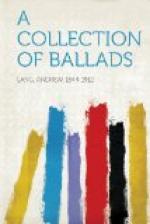“Revenge! revenge!” auld Wat ’gan
cry;
“Fye, lads, lay on them cruellie!
We’ll ne’er see Tiviotside again,
Or Willie’s death revenged shall be.”
O mony a horse ran masterless,
The splintered lances flew on hie;
But or they wan to the Kershope ford,
The Scots had gotten the victory.
John o’ Brigham there was slain,
And John o’ Barlow, as I hear say;
And thirty mae o’ the captain’s men,
Lay bleeding on the grund that day.
The captain was run thro’ the thick of the thigh—
And broken was his right leg bane;
If he had lived this hundred year,
He had never been loved by woman again.
“Hae back thy kye!” the captain said;
“Dear kye, I trow, to some they be!
For gin I suld live a hundred years,
There will ne’er fair lady smile on me.”
Then word is gane to the captain’s bride,
Even in the bower where that she lay,
That her lord was prisoner in enemy’s land,
Since into Tividale he had led the way.
“I wad lourd have had a winding-sheet,
And helped to put it ower his head,
Ere he had been disgraced by the Border Scot,
When he ower Liddel his men did lead!”
There was a wild gallant amang us a’,
His name was Watty wi’ the Wudspurs,
Cried—“On for his house in Stanegirthside,
If ony man will ride with us!”
When they cam to the Stanegirthside,
They dang wi’ trees, and burst the door;
They loosed out a’ the captain’s kye,
And set them forth our lads before.
There was an auld wife ayont the fire,
A wee bit o’ the captain’s kin—
“Wha daur loose out the captain’s kye,
Or answer to him and his men?”
“It’s I, Watty Wudspurs, loose the kye,
I winna layne my name frae thee!
And I will loose out the captain’s kye,
In scorn of a’ his men and he.”
When they cam to the fair Dodhead,
They were a wellcum sight to see!
For instead of his ain ten milk-kye,
Jamie Telfer has gotten thirty and three.
And he has paid the rescue shot,
Baith wi’ goud, and white monie;
And at the burial o’ Willie Scott,
I wot was mony a weeping e’e.
Ballad: The Douglas Tragedy
(Child, vol. ii. Early Edition.)
“Rise up, rise up now, Lord Douglas,”
she says,
“And put on your armour so bright;
Let it never be said that a daughter of thine
Was married to a lord under night.
“Rise up, rise up, my seven bold sons,
And put on your armour so bright,
And take better care of your youngest sister,
For your eldest’s awa the last night.”—
He’s mounted her on a milk-white steed,
And himself on a dapple grey,
With a bugelet horn hung down by his side,
And lightly they rode away.
Lord William lookit o’er his left shoulder,
To see what he could see,
And there be spy’d her seven brethren bold,
Come riding o’er the lee.




